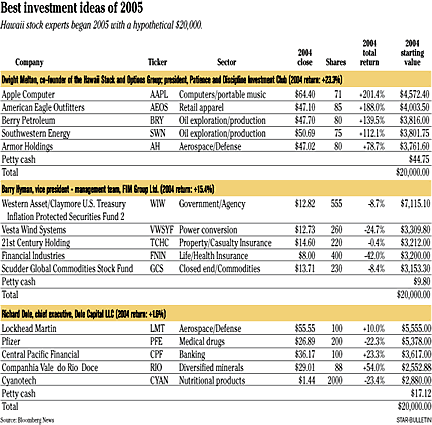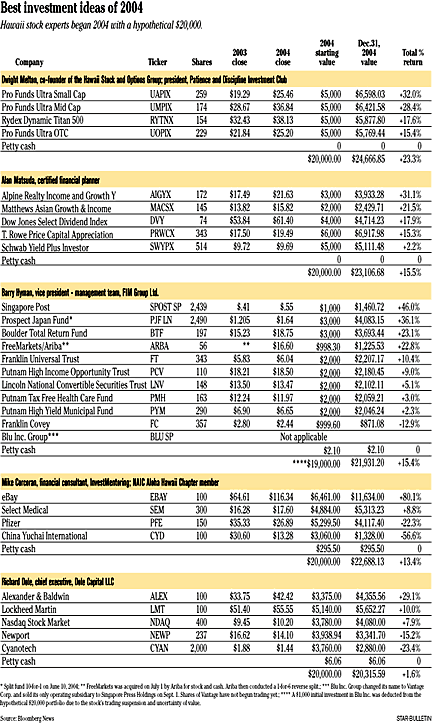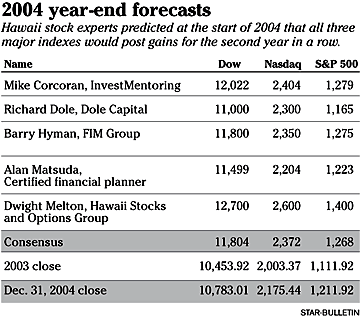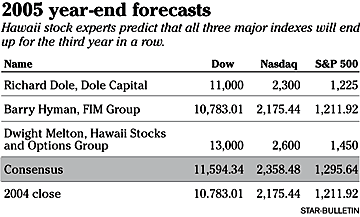Stock pickers see
2005 as another year
of potential volatility
Participants in the Star-Bulletin's
annual contest favor continued
strength in energy companies
Financial adviser Barry Hyman said at the start of 2004 that U.S. stocks were overvalued.
A year of modest single-digit gains in the three major indexes hasn't changed that opinion.
"We feel U.S. stocks as a whole are priced well above their intrinsic values," said Hyman, a vice president in charge of the Maui branch for Michigan-based FIM Group Ltd. "But that often doesn't stop speculators from pushing them to higher levels -- at least for the time being."
Hyman, one of three participants in a Star-Bulletin survey of best investment ideas for 2005, continues to see better opportunities overseas.
"Sectors we favor are foreign small-company value stocks, especially in (foreign) sectors like energy and natural resources, specific consumer products, certain medical and health care fields, and high-grade bonds, especially foreign government bonds," Hyman said.
The format of the Star-Bulletin's annual survey is being tweaked this year to give local experts the opportunity to change their $20,000 hypothetical portfolio once a quarter. Another change is that the experts' picks are limited to three to five investments that trade on U.S. markets. Mutual funds and index funds were ineligible for selection. The experts submitted their picks during the final week of 2004.
Other participants include Dwight Melton, co-founder of the newly established Hawaii Stock and Options Group; and Richard Dole, chief executive of investment banker Dole Capital LLC.
"I would not be surprised if the markets ran up 20 percent this year, or if they fell by 30 percent," Hyman said. "Investing in 'the market' is dangerous and not what we advise to anyone. Investing in individual securities after doing nonbiased due diligence -- for example, research -- is the way to decrease the risks of investing while increasing the likelihood of success."
That said, Hyman won't be accused of jumping on the bandwagon of 2004's hottest stocks. All of Hyman's picks for 2005 finished in the red last year.

Closed-end companies issue a fixed number of shares and trade as stocks.
"This closed-end bond fund is a high-octane way of investing in low-risk bonds," Hyman said. "It also gives exposure to foreign currencies, a plus if the dollar continues to slide. And at current prices, it is trading at an 8.25 percent discount to the net asset value (worth) of the securities it holds."
Melton, whose 23.3 percent gain topped the local experts in last year's contest, emphasized energy with two of his five picks coming in that sector. He selected oil exploration and production companies Berry Petroleum Co. and Southwestern Energy Co.
"Berry Petroleum is getting noticed on Wall Street," Melton said. "Profits have soared as a result of sky-high oil prices. All the money the company has made has allowed it to boost the capital budget, reduce debt and increase the regular dividend."
But Melton said that the high price of oil, high budget and trade deficits and the weakening dollar will have to be monitored. He also said there are concerns that the Federal Reserve will have to raise interest rates before it is satisfied that stability can be achieved on the inflation front.
"Should there be a marked deterioration along one or more of these fronts, particularly oil, or should there be an escalation in military tensions around the globe or an increase in terrorist activity, the economic upturn's resilience would be tested," he said.
Dole, whose picks last year generated a 1.6 percent gain, picked two Hawaii stocks among his five selections. He chose Central Pacific Financial Corp., which last September merged with City Bank parent CB Bancshares Inc.; and Cyanotech Corp., a Big Island producer of human and animal nutrients from microalgae.
Dole said Cyanotech may benefit from the conversion of existing ponds to higher-margin ponds and, as an exporter, could be aided by a weak dollar. He said Central Pacific may benefit from cost savings resulting from the merger of the two banks.
Last quarter proved
to be difference for
winning stock picker
Dwight Melton's portfolio surged
at the end to take the lead in
the Star-Bulletin's contest
Dwight Melton was thinking small in 2004 and he was rewarded with big stock gains because of it.
The co-founder of the newly established Hawaii Stock and Options Group rode small- and mid-cap funds over the final two months of the year to an overall 23.3 percent gain and top honors in the Star-Bulletin's annual survey of best investment ideas.
It was quite a finishing kick for Melton, whose hypothetical $20,000 portfolio was down 1.3 percent after three quarters and had him in fourth place out of five local stock experts. Historically, though, the month of November begins the best three-month stretch for the stock market, and Melton had the right funds at the right time.
"It was the trend of the overall market because last year was really a rough year for equities in general," Melton said. "The fourth quarter historically has been a great quarter for the entire market."
In fact, all five stock forecasters padded their 2004 returns during the final three months of the year with four of the experts outperforming the 10.9 percent total return for the year of the benchmark Standard & Poor's 500 index.
Certified Financial Planner Alan Matsuda, a newcomer to the contest in 2004, had the second-best performance with a 15.5 percent gain after leading at the three-quarter mark with a 7.4 percent return.

InvestMentoring financial consultant Mike Corcoran also reached double digits with a a 13.4 percent gain thanks to the contest's best individual-performing investment in eBay Inc., which surged 80.1 percent for the year. Corcoran's portfolio was down 1.2 percent on Sept. 30.
Richard Dole, chief executive of investment banker Dole Capital LLC, also turned a loss into a gain as he ended with a 1.6 percent return after being 14.5 percent in the red after three quarters.
Melton's top selections were the Pro Funds Ultra Small Cap Fund, up 32 percent; and the Pro Funds Ultra Mid Cap Fund, up 28.4 percent.
"Getting the presidential election out of the way was a major hurdle," Melton said. "And the war on terrorism has more direction now by having that administration remain in place. That was another uncertainty."
He said, though, that he still has reservations about stocks because of five straight quarter-point interest rate hikes by the Federal Open Market Committee.
"Eventually, that's going to have an effect on the overall market," said Melton, whose new investment group meets at 9 a.m. every Saturday at the Kaimuki Recreation Center.
Matsuda avoided picking individual stocks because of the short one-year duration of the contest but still ended up with some big gains through his fund selections. His best pick was Alpine Realty Income and Growth Y, a real estate investment trust which zoomed 31.1 percent.
"REIT funds, as a group, have been smashing the overall stock market," Matsuda said. "Lesson learned: a good REIT fund is a valuable diversification tool."

Like Melton, Matsuda also credited Bush's re-election to the rise in the stock market.
"His platform must be attractive to the public and to the stock market: permanent tax cuts and privatize -- partially and selective initially -- Social Security enabling the addition of millions more investors in stocks," Matsuda said.
Hyman, a value investor who ventured overseas for some of his picks, was rewarded for his diligence as Singapore Post, which provides postal services, soared 46 percent and Prospect Japan Fund, which invests in small Japan companies, jumped 36.1 percent. Nine of his 10 picks posted gains while another selection, Singapore company Blu Inc., was dropped from the results because its shares have been suspended following the acquisition of its only operating subsidiary.
"Of the stocks I chose last year, only Franklin-Covey had a slight negative total return," Hyman said. "And we still like FC very much at current price levels."
Hyman said his selection of Boulder Total Return Fund, which rose 23.1 percent, was "a discounted way to invest in large-cap value U.S. stocks."
Corcoran, whose allegiance to eBay paid off with the contest's best gain, also had the worst performer in diesel engine maker China Yuchai International, which stumbled 56.6 percent.
Dole was the only expert to dabble with local stocks. One of them, Alexander & Baldwin Inc., came on strong to end the year up 29.1 percent. The other, Cyanotech Corp., fell 23.4 percent.
Dow defied optimists’
predictions in tepid 2004
In the end, Hawaii stock experts were too optimistic about how the three major indexes would fare in 2004.Despite a presidential year which historically bodes well for the market, the uncertainty of the election, high oil prices and the Iraq war combined to keep a lid on stock returns.
The Dow Jones industrial average, which ended 2004 at 10,783.01, was 14.6 percent below the consensus pick of 11,804 by five local prognosticators. The Nasdaq composite index, which closed at 2,175.44, was 8.3 percent under the consensus of 2,372. And the Standard & Poor's 500 index, which finished at 1,211.92, was 4.4 percent shy of the consensus of 1,268.
Richard Dole, chief executive of investment banker Dole Capital LLC, had the best Dow prediction with 11,000. Certified Financial Planner Alan Matsuda was closest to the Nasdaq finish with a pick of 2,204 and the nearest to the S&P's close with a pick of 1,223.
[News] [Business] [Features] [Sports] [Editorial] [Do It Electric!]
[Classified Ads] [Search] [Subscribe] [Info] [Letter to Editor]
[Feedback]

